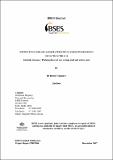| Author | Magarey, RC |
| Date Accessioned | 2012-11-14 |
| Date Available | 2012-11-14 |
| Issued | 2007 |
| Identifier | http://hdl.handle.net/11079/1121 |
| Abstract | Previous work has shown that plant improvement stage 3 selection trials can be used to assess the relationship between yield and disease resistance with particular Queensland endemic diseases - principally Pachymetra root rot, yellow spot and orange rust. Results provide a means for fine-tuning the plant improvement program - ensuring that commercial varieties have just the right level of resistance to maximise high yielding ability while minimising disease-associated yield losses.In this study, data from 2003-series stage 3 (FATs) trials in northern and central districts were studied to determine the relationship between resistance and yield for Pachymetra root rot and orange rust. As yellow spot only occurs in the high rainfall areas of northern Queensland, analyses for this disease were restricted to this region only. Brown rust was to be included in the study but the difficulty is assessing disease resistance in FATs, and the lack of disease, made obtaining data to brown rust impossible. Additional data were available for Pachymetra root rot for northern series trials (1995-2004) providing more detailed information for this disease. |
| Language | en |
| Publisher | BSES |
| Part of Series | BSES Internal Report; 2007 No 1402 Report PR07004 |
| Subject | Disease management |
| Subject | Yield loss |
| Subject | Plant breeding |
| Subject | Disease resistance profile |
| Subject | Brown rust |
| Subject | Orange rust |
| Subject | Yellow spot |
| Subject | Pachymetra root rot |
| Subject | Factors affecting disease ocurrence |
| Subject | Yield and disease resistance |
| Title | Estimating disease-associated yield losses in breeding selection trials - Endemic diseases; Pachymetra root rot, orange rust and yellow spot |

